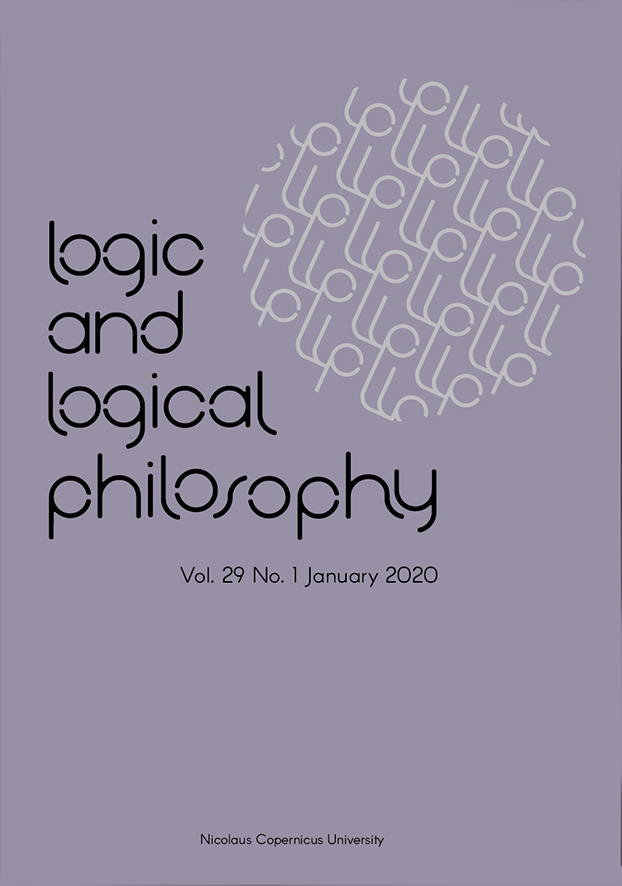The Nature of Scientific Philosophy
DOI:
https://doi.org/10.12775/LLP.2019.029Słowa kluczowe
science, philosophy, mathematics, a priori knowledge, principle of duality, quantity, qualityAbstrakt
The goal of this paper is to explain the nature of philosophy as a distinct science with its own subject-matter. This is achieved through a comparative analysis of mathematical and philosophical knowledge that reveals a profound similarity between mathematics and philosophy as mutually complementary sciences exploring the field of abstract entities that can be comprehended only by purely a priori theoretical inquiry. By considering this complementarity, a general definition of philosophy can be obtained by dualizing the traditional Aristotelian definition of mathematics as the “science of quantity”. Philosophy should thus be interpreted as an a priori science of the pure qualitative attributes of being.Bibliografia
Bailey, D.H., J.M. Borwein, N.J. Calkin, R. Girgensohn, D.R. Luke and V.H. Moll, Experimental Mathematics in Action, Wellesley, MA: A K Peters, 2007. DOI: http://dx.doi.org/10.1201/9781439864333
Blackburn, S., The Oxford Dictionary of Philosophy, 3rd edition, Oxford University Press, 2016. DOI: http://dx.doi.org/9780198735304.001.0001
Bourbaki, N. L’Architecture des mathematiques. Les grands courants de la pensée mathématique, Marseille: Cahiers du Sud, 1948.
Elliott-Graves, A., and M. Weisberg, “Idealization”, Philosophy Compass 9, 3 (2014): 176–185. DOI: http://dx.doi.org/10.1111/phc3.12109
Franklin, J., “Aristotelian realism”, pages 103–155 in A. Irvine (ed.), The Philosophy of Mathematics, Handbook of the Philosophy of Science series, North-Holland Elsevier, 2009. DOI: http://dx.doi.org/10.1016/B978-0-444-51555-1.50007-9
Friedland, J., “Philosophy is not a science”, The New York Times, April 5, 2012: https://opinionator.blogs.nytimes.com/2012/04/05/philosophy-is-not-a-science
Frege, G. The Foundations of Arithmetic: A Logico-Mathematical Enquiry into the Concept of Number, New York: Harper and Brothers, 1960.
Hegel, G.W.F., Encyclopedia of the Philosophical Sciences in Basic Outline, Part I: Science of Logic, edited and translated by K. Brinkmann and D.O. Dahlstrom, Cambridge University Press, 2015.edited and translated by K. Brinkmann and D.O. Dahlstrom, Cambridge University Press, 2015.
Hempel, C., “On the nature of mathematical truth”, pages 378–393 in P. Benacerraf and H. Putnam (eds.), Philosophy of Mathematics. Selected Readings, 2nd edition, Cambridge: Cambridge University Press, 1984. DOI: http://dx.doi.org/10.1017/CBO9781139171519.020
Husserl, E., Logical Investigations, vol. I, London and New York: Routledge, 2001.
Jenkins, C., “A priori knowledge: debates and developments”, Philosophy Compass 3, 3 (2008): 436–450. DOI: http://dx.doi.org/10.1111/j.1747-9991.2008.00136.x
Johnson, R., Manifest Rationality: A Pragmatic Theory of Argument, Mahwah, NJ: Lawrence Erlbaum Associates, 2000. DOI: http://dx.doi.org/10.4324/9781410606174
Kant, I. Lectures on Logic, translated and edited by J. Michael Young, Cambridge: Cambridge University Press, 1992.
Kant, I., Critique of Pure Reason, translated and edited by P. Guyer and Al.W. Wood, Cambridge: Cambridge University Press, 1998.
Knobe, J., and S. Nichols, “Experimental philosophy”, The Stanford Encyclopedia of Philosophy, Winter 2017 Edition, E.N. Zaltaã(ed.). https://plato.stanford.edu/archives/win2017/entries/experimental-philosophy/
Kraft, V., Der Wiener Kreis: Der Ursprung des Neopositivismus. Ein Kapitel der jüngsten Philosophiegeschichte, Wien–New York: Springer-Verlag, 1968.
Montague, R., “On the nature of certain philosophical entities”, Monist 53, 2 (1969): 159–194. DOI: http://dx.doi.org/10.5840/monist19695327
Natorp, P., Philosophische Propädeutik: Allgemeine Einleitung in die Philosophie und Anfangsgründe der Logik, Ethik und Psychologie, Marburg: N.G. Elwert, 1905.
Peirce, C.S., “An outline classification of the sciences”, pages 203–283 in The Collected Papers, vol. 1, 1902.
Penguin English Dictionary, 3rd edition, Penguin, 2007.
Priest, G., “What is philosophy?”, Philosophy 81 (2006): 189–207. DOI: http://dx.doi.org/10.1017/S0031819106316026
Restall, G., “A priori truths”, pages 37–50 in J. Shand (ed.), Central Issues of Philosophy, Malden, Mass.: Wiley-Blackwell, 2009. DOI: http://dx.doi.org/10.1002/9781444315837.ch3
Schopenhauer, A., On the Fourfold Root of the Principle of Sufficient Reason and On the Will in Nature: Two Essays, revised edition, London: George Bell and Sons, 1907.
Schlick, M., “The turning point in philosophy”, pages 53–59 in A.J. Ayer, Logical Positivism, Glencoe, IL: Free Press, 1959.
Shramko, Y., “The logical way of being true: truth values and the ontological foundation of logic”, Logic and Logical Philosophy 23, 2 (2014): 119–131. DOI: http://dx.doi.org/10.12775/LLP.2013.031
Spinoza, B., The Complete Works, edited, with introductions, by M.L. Morgan, translated by S. Shirley, Indianapolis/Cambridge: Hackett Publishing Company, 2002.
Williamson, T., The Philosophy of Philosophy, Malden, Mass.: Blackwell,
DOI: http://dx.doi.org/10.1002/9780470696675
Windelband, W., “Was ist Philosophie?”, in Präludien, Tübingen: Verlag von J.C.B. Mohr (Paul Siebeck), 1907.
Wolff, Ch., Einleitende Abhandlung über Philosophie im allgemeinen, Stuttgart: Frommann-Holzboog, 2006.
Wundt, W., Einleitung in die Philosophie, Leipzig: Verlag von Wilhelm Engelmann, 1904.
Pobrania
Opublikowane
Jak cytować
Numer
Dział
Statystyki
Liczba wyświetleń i pobrań: 848
Liczba cytowań: 0







